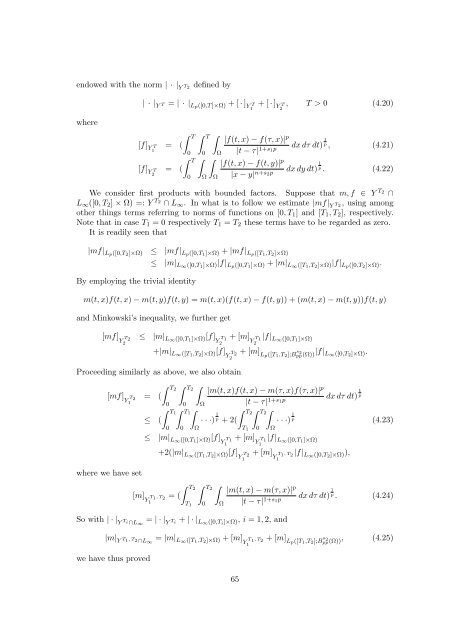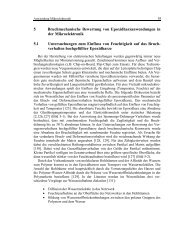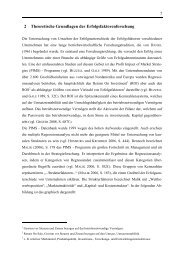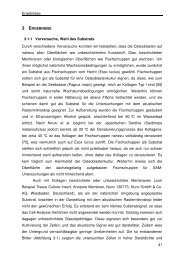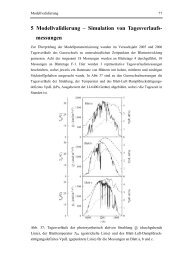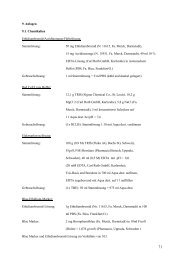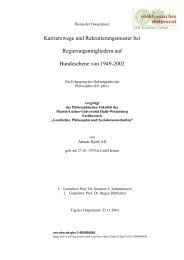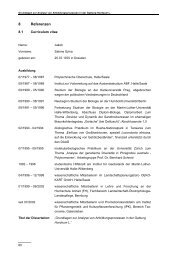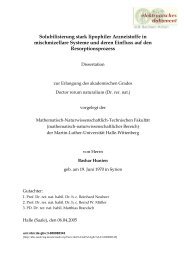Quasilinear parabolic problems with nonlinear boundary conditions
Quasilinear parabolic problems with nonlinear boundary conditions
Quasilinear parabolic problems with nonlinear boundary conditions
You also want an ePaper? Increase the reach of your titles
YUMPU automatically turns print PDFs into web optimized ePapers that Google loves.
endowed <strong>with</strong> the norm | · | Y T 2 defined by<br />
where<br />
| · | Y T = | · | Lp([0,T ]×Ω) + [ · ] Y T<br />
1 + [ · ] Y T<br />
2 , T > 0 (4.20)<br />
� T � T �<br />
[f] Y T<br />
1<br />
= (<br />
0 0<br />
� T �<br />
Ω<br />
�<br />
[f] Y T<br />
2<br />
= (<br />
0 Ω Ω<br />
|f(t, x) − f(τ, x)| p<br />
|t − τ| 1+s1p<br />
|f(t, x) − f(t, y)| p<br />
|x − y| n+s2p<br />
dx dτ dt) 1<br />
p , (4.21)<br />
dx dy dt) 1<br />
p . (4.22)<br />
We consider first products <strong>with</strong> bounded factors. Suppose that m, f ∈ Y T2 ∩<br />
L∞([0, T2] × Ω) =: Y T2 ∩ L∞. In what is to follow we estimate |mf| Y T 2 , using among<br />
other things terms referring to norms of functions on [0, T1] and [T1, T2], respectively.<br />
Note that in case T1 = 0 respectively T1 = T2 these terms have to be regarded as zero.<br />
It is readily seen that<br />
|mf| Lp([0,T2]×Ω) ≤ |mf| Lp([0,T1]×Ω) + |mf| Lp([T1,T2]×Ω)<br />
≤ |m| L∞([0,T1]×Ω)|f| Lp([0,T1]×Ω) + |m| L∞([T1,T2]×Ω)|f| Lp([0,T2]×Ω).<br />
By employing the trivial identity<br />
m(t, x)f(t, x) − m(t, y)f(t, y) = m(t, x)(f(t, x) − f(t, y)) + (m(t, x) − m(t, y))f(t, y)<br />
and Minkowski’s inequality, we further get<br />
[mf] Y T 2<br />
2<br />
≤ |m| L∞([0,T1]×Ω)[f] Y T 1<br />
2<br />
+|m| L∞([T1,T2]×Ω)[f] Y T 2<br />
2<br />
Proceeding similarly as above, we also obtain<br />
[mf] Y T 2<br />
1<br />
where we have set<br />
� T2<br />
= (<br />
≤ (<br />
� T2<br />
0 0<br />
� � T1 T1<br />
0<br />
0<br />
�<br />
�<br />
Ω<br />
≤ |m| L∞([0,T1]×Ω)[f] Y T 1<br />
1<br />
[m] Y T 1 , T 2<br />
1<br />
+ [m] T<br />
Y 1 |f| L∞([0,T1]×Ω)<br />
2<br />
+ [m] Lp([T1,T2];B s 2<br />
pp(Ω)) |f| L∞([0,T2]×Ω).<br />
|m(t, x)f(t, x) − m(τ, x)f(τ, x)| p<br />
|t − τ| 1+s1p<br />
�<br />
Ω<br />
· · ·) 1<br />
� � T2 T2<br />
p + 2(<br />
T1 0<br />
+2(|m| L∞([T1,T2]×Ω)[f] Y T 2<br />
1<br />
� T2<br />
= (<br />
T1<br />
� T2<br />
0<br />
�<br />
Ω<br />
dx dτ dt) 1<br />
p<br />
· · ·)<br />
Ω<br />
1<br />
p (4.23)<br />
+ [m] T<br />
Y 1 |f| L∞([0,T1]×Ω)<br />
1<br />
+ [m] T<br />
Y 1 , T2 |f| L∞([0,T2]×Ω)),<br />
1<br />
|m(t, x) − m(τ, x)| p<br />
|t − τ| 1+s1p<br />
So <strong>with</strong> | · | Y T i∩L∞ = | · | Y T i + | · | L∞([0,Ti]×Ω), i = 1, 2, and<br />
|m| Y T 1 , T 2 ∩L∞ = |m| L∞([T1,T2]×Ω) + [m] Y T 1 , T 2<br />
1<br />
we have thus proved<br />
65<br />
dx dτ dt) 1<br />
p . (4.24)<br />
+ [m] Lp([T1,T2];B s2 , (4.25)<br />
pp(Ω))


